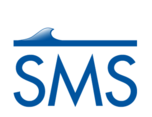SMS:SMS: Difference between revisions
No edit summary |
|||
| Line 16: | Line 16: | ||
Much of the SMS functionality is divided into [[SMS:Modules|Modules]] based upon the type of data (grids, meshes, GIS, etc). SMS also contains [[SMS:General Interface Features|features]] that are not tied to specific modules. | Much of the SMS functionality is divided into [[SMS:Modules|Modules]] based upon the type of data (grids, meshes, GIS, etc). SMS also contains [[SMS:General Interface Features|features]] that are not tied to specific modules. | ||
SMS supports a number of [[SMS: | SMS supports a number of [[SMS:SMS Models|Numerical Models]] with a variety of uses including hydraulics, wave modeling, and particle tracking. | ||
See [[SMS:Layout|Layout of the Graphical Interface]] for more information on the organization of the toolbars, menus, and windows in SMS. | See [[SMS:Layout|Layout of the Graphical Interface]] for more information on the organization of the toolbars, menus, and windows in SMS. | ||
| Line 29: | Line 29: | ||
== Installation == | == Installation == | ||
* [[SMS: | * [[SMS:Introduction to Setting up SMS|Installing and Setting up SMS]] | ||
* [[SMS:System Requirements|System Requirements]] | * [[SMS:System Requirements|System Requirements]] | ||
* [[SMS:License Agreement|License Agreement]] | * [[SMS:License Agreement|License Agreement]] | ||
Revision as of 17:54, 4 April 2013
The Surface-water Modeling System (SMS)
The Surface-water Modeling System (SMS) is a graphical user interface and analysis tool that allows engineers and scientists to visualize, manipulate, analyze and understand numerical data and associated measurements. Many of the tools in SMS are generic. They are designed to facilitate the establishment and operation of numerical models of rivers, coasts, inlets, bays, estuaries, and lakes.
What's New
SMS 11.0 was released in December of 2011. Monthly updates have followed since. To see what issues have been addressed in these updates, please refer to the Release notes.
- What's New in SMS 11.1
- Bugfixes.
- Version History
Introduction to SMS
The Highlights provides a summary of SMS capabilities.
The SMS Tutorials are step by step guides for building models and using SMS features. They are an excellent place to begin learning how to use SMS.
Much of the SMS functionality is divided into Modules based upon the type of data (grids, meshes, GIS, etc). SMS also contains features that are not tied to specific modules.
SMS supports a number of Numerical Models with a variety of uses including hydraulics, wave modeling, and particle tracking.
See Layout of the Graphical Interface for more information on the organization of the toolbars, menus, and windows in SMS.
A list of Publications and Reports produced using SMS.
Federal Highways Administration (FHWA) and Aquaveo have partnered to present FHWA Webinars about using SMS and WMS.
User Manuals:
Installation
Support
SMS – Surface-water Modeling System | ||
|---|---|---|
| Modules: | 1D Grid • Cartesian Grid • Curvilinear Grid • GIS • Map • Mesh • Particle • Quadtree • Raster • Scatter • UGrid |  |
| General Models: | 3D Structure • FVCOM • Generic • PTM | |
| Coastal Models: | ADCIRC • BOUSS-2D • CGWAVE • CMS-Flow • CMS-Wave • GenCade • STWAVE • WAM | |
| Riverine/Estuarine Models: | AdH • HEC-RAS • HYDRO AS-2D • RMA2 • RMA4 • SRH-2D • TUFLOW • TUFLOW FV | |
| Aquaveo • SMS Tutorials • SMS Workflows | ||
